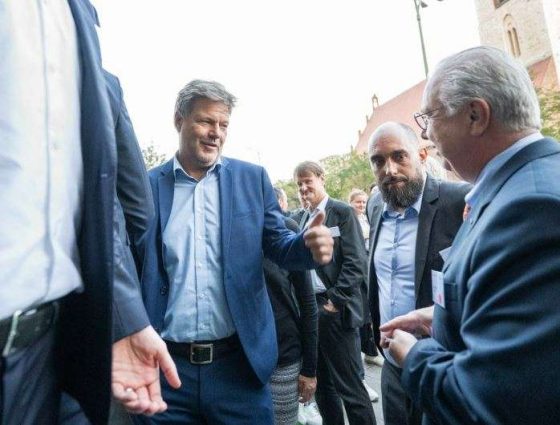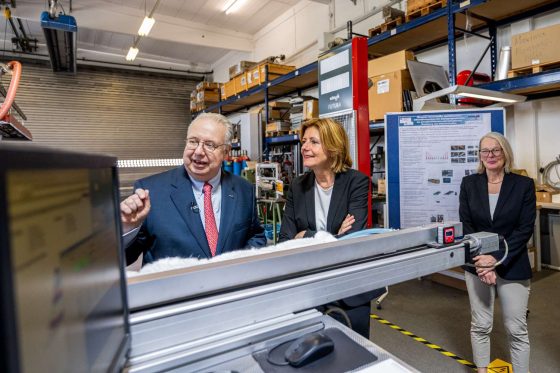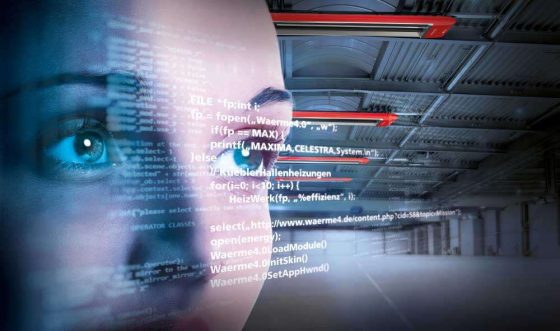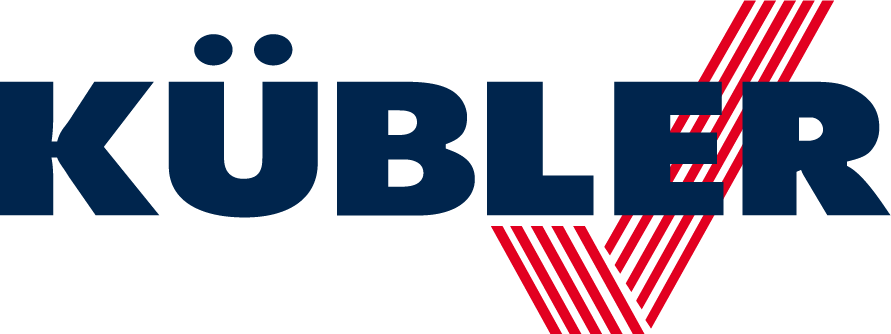Energy efficiency 2.0: AI revolution in hall heating technology
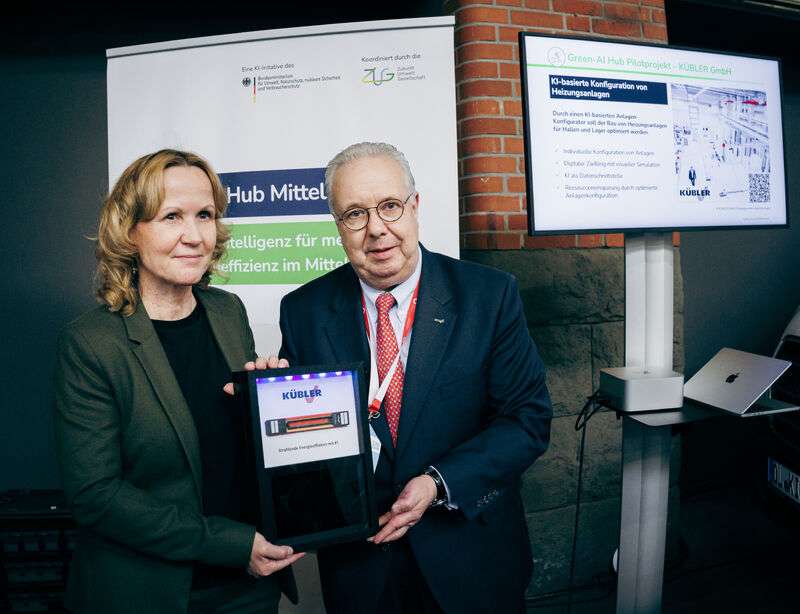
"The fusion of artificial intelligence with advanced, dynamic infrared indoor heating systems marks a revolutionary era in energy efficiency and individually adapted indoor climates," says Thomas Kübler, founder and managing partner of KÜBLER GmbH. The rapid responsiveness of infrared heating compared to slower systems, such as a heat pump in combination with hydraulics, represents a decisive advantage. This dynamic is reinforced by the optimized integration of artificial intelligence, which ensures more efficient comfort with minimal energy losses. The significant role of this decisive advantage is particularly evident in intelligent controls, which enable immediate and customized adaptation to individual user requirements such as different temperature zones in a hall building, even without partition walls. The pilot project at KÜBLER GmbH uses an AI-based system configurator to optimize the construction of heating systems for halls and warehouses.
The successful pilot project is presented on the Green-AI Hub website under the title "AI-based configuration of heating systems":
Construction of hall heating systems
KÜBLER manufactures systems that heat halls in a particularly energy-efficient manner. The portfolio is supplemented by device variants with lighting, cooling and ventilation concepts as well as thermal-supported heating. The latest generation of infrared heaters (FUTURA and MAXIMA E-Hybrid) use biogas, liquid gas, hydrogen (components), natural gas or electricity. Depending on price or availability, it is possible to switch back and forth between these energy sources.
Individual configuration of systems
3D models of the halls are used for planning to ensure the efficient use of heating systems. Materials made of metals, plastics, cardboard, glass fibers and composite materials are used in the production process. The company has various individual solutions for configuring, planning and preparing quotations for systems, such as calculating the heating load and selecting the type and number of units. Information on the systems, such as CAD plans and operating data, is available in various formats at different locations.
Digital twin with visual simulation
The pilot project of the Green-AI Hub Mittelstand therefore links the different pieces of information for the first time via a digital twin. This analyses the data, which enables enormous savings potential for future systems by revealing oversizing and optimizing the technical coordination of individual system components.
The digital twin is supplemented by mixed reality glasses that visualize the system. This allows planned installations to be checked visually in advance on site, e.g. in an assembly hall, in order to identify the most suitable installation of the hall heating based on experience and visual feedback. This can be adjusted again later in the process if necessary. The visual simulation can be used to identify any direct savings potential, such as the fact that fewer or smaller systems are required than originally assumed. Indirect savings potential can also be identified. For example, it is possible to determine whether an additional appliance is required. This would allow the heating appliances to run in their efficient operating mode for longer and be used in a more resource-friendly, durable and generally more sustainable way.
AI as a data interface
The digital twin enables resource savings to be achieved in various phases. A digital product passport within the digital twin lists recyclable components, a step towards a circular economy. Savings can also be achieved during operation. Simulation and mixed reality visualization scenarios can be used to reduce the number or size of systems used. It is also possible to avoid peak operation using the digital image of the appliances in the digital twin and knowledge of appliance usage. This protects the appliances and reduces energy consumption in the form of electricity and gas.
The pilot project considers the hall heating systems in an overall context (Smart Living, Smart City, Industry 4.0 etc.) and includes other sensors and information sources (e.g. hall activity) in the analysis (shared data space). This makes it possible to formulate more precise assessments of usage patterns and types, and therefore holistic predictions. A standardized data interface in the digital twin bundles all data that is important for operations.
Optimized system configuration saves resources
The use of AI not only has an impact on the resource efficiency of the company, but also on the resource efficiency of the customers where the corresponding infrared heaters from KÜBLER have been or will be installed. This also applies retroactively to infrared heaters that have already been installed. For example, maintenance can be adapted to avoid system failure, cost-intensive, unscheduled repairs, wasted resources for travel or cost-intensive consequential damage. Improved planning and dimensioning of new halls allows usage data to be collected and the size and equipment of similar halls to be better planned in future. In addition, AI and the digital twin of the heating systems are being developed and continuously improved. The pilot project will save material, energy and CO₂ in equal measure.
The BMUV's Green AI Hub for SMEs
The Green-AI Hub Mittelstand (www.green-ai-hub.de) is an AI initiative of the Federal Ministry for the Environment (BMUV). It supports companies in implementing their own AI projects with the aim of saving resources and materials.
Interested in our press photos?
Would you like to download all images from the article in the highest quality? Simply click on the button below and enjoy our press photos in the highest resolution!
-
Berlin, September 2023: Energy efficiency is a key pillar of the energy transition - and a topic that all three are committed to: Thomas Kübler, specialist for energy-saving hall heating systems, Dr. Robert Habeck, head of the BMWK, and the German Business Initiative for Energy Efficiency (DENEFF).
-
As of today, it's clear: the world first from KÜBLER has won its third award! Following the SUCCESS 2022 Technology Award and the Rhineland-Palatinate 2023 Innovation Award, the innovative FUTURA multi-energy IR heating system for the climate-friendly and economical heating of hall buildings has now been recognized in the "Winner" category of the German Innovation Award 2023.
-
Food. Climate protection is a hot topic - and not just since Greta Thunberg. Hall heating specialist and efficiency expert KÜBLER will be demonstrating the immense energy and CO₂ savings potential that can be achieved in the heating of hall buildings alone. It will be presenting its high-efficiency solutions at SHK Essen from March 10-13.
-
"We have left hot air blowers behind us, dark radiators could only use gas and heat pumps have proven to be less functional in halls. Hall heating needs a new technological paradigm in order to meet the requirements of the future at all levels," says Thomas Kübler, Managing Partner of KÜBLER, the leading specialist for hall heating technologies. NEW: Fair.AIdH technologies. The new hall heating category. "Fair.AIdH is [...]
